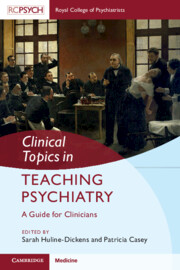Book contents
- Clinical Topics in Teaching Psychiatry
- Clinical Topics in Teaching Psychiatry
- Copyright page
- Dedication
- Contents
- Contributors
- A Note on the Cover
- Introduction
- Section 1 Teaching and Preparation
- Chapter 1 Improving Patient Care through Continuing Professional Development
- Chapter 2 The MRCPsych: Preparing Trainees and Improving Courses
- Chapter 3 Going Beyond ‘Good Enough’ Teaching in Psychiatric Training
- Chapter 4 A Guide to Conducting an Online Literature Search for Medical Educators
- Chapter 5 Writing for Learning and Publication
- Section 2 Teaching Methods
- Section 3 Feedback, Assessment and Supervision
- Section 4 Bridging the Gaps: Foundation Years and Interprofessional Education
- Section 5 Technologies Old and New
- Section 6 Supporting the Trainee in Difficulty
- Index
- References
Chapter 2 - The MRCPsych: Preparing Trainees and Improving Courses
from Section 1 - Teaching and Preparation
Published online by Cambridge University Press: 24 November 2022
- Clinical Topics in Teaching Psychiatry
- Clinical Topics in Teaching Psychiatry
- Copyright page
- Dedication
- Contents
- Contributors
- A Note on the Cover
- Introduction
- Section 1 Teaching and Preparation
- Chapter 1 Improving Patient Care through Continuing Professional Development
- Chapter 2 The MRCPsych: Preparing Trainees and Improving Courses
- Chapter 3 Going Beyond ‘Good Enough’ Teaching in Psychiatric Training
- Chapter 4 A Guide to Conducting an Online Literature Search for Medical Educators
- Chapter 5 Writing for Learning and Publication
- Section 2 Teaching Methods
- Section 3 Feedback, Assessment and Supervision
- Section 4 Bridging the Gaps: Foundation Years and Interprofessional Education
- Section 5 Technologies Old and New
- Section 6 Supporting the Trainee in Difficulty
- Index
- References
Summary
Changes to the Member of the Royal College of Psychiatrists (MRCPsych) examination and the current COVID-19 pandemic require adaptation of existing teaching and training for core psychiatry trainees. With the General Medical Council (GMC) also limiting the number of times that a candidate can attempt the MRCPsych examination, there is growing pressure to ensure that course organizers are maximizing trainees’ potential to pass. Using our experiences of running MRCPsych courses in Birmingham and Keele we discuss how courses can be developed to best prepare trainees for the MRCPsych written papers and the Clinical Assessment of Skills and Competencies (CASC).
- Type
- Chapter
- Information
- Clinical Topics in Teaching PsychiatryA Guide for Clinicians, pp. 18 - 28Publisher: Cambridge University PressPrint publication year: 2022



